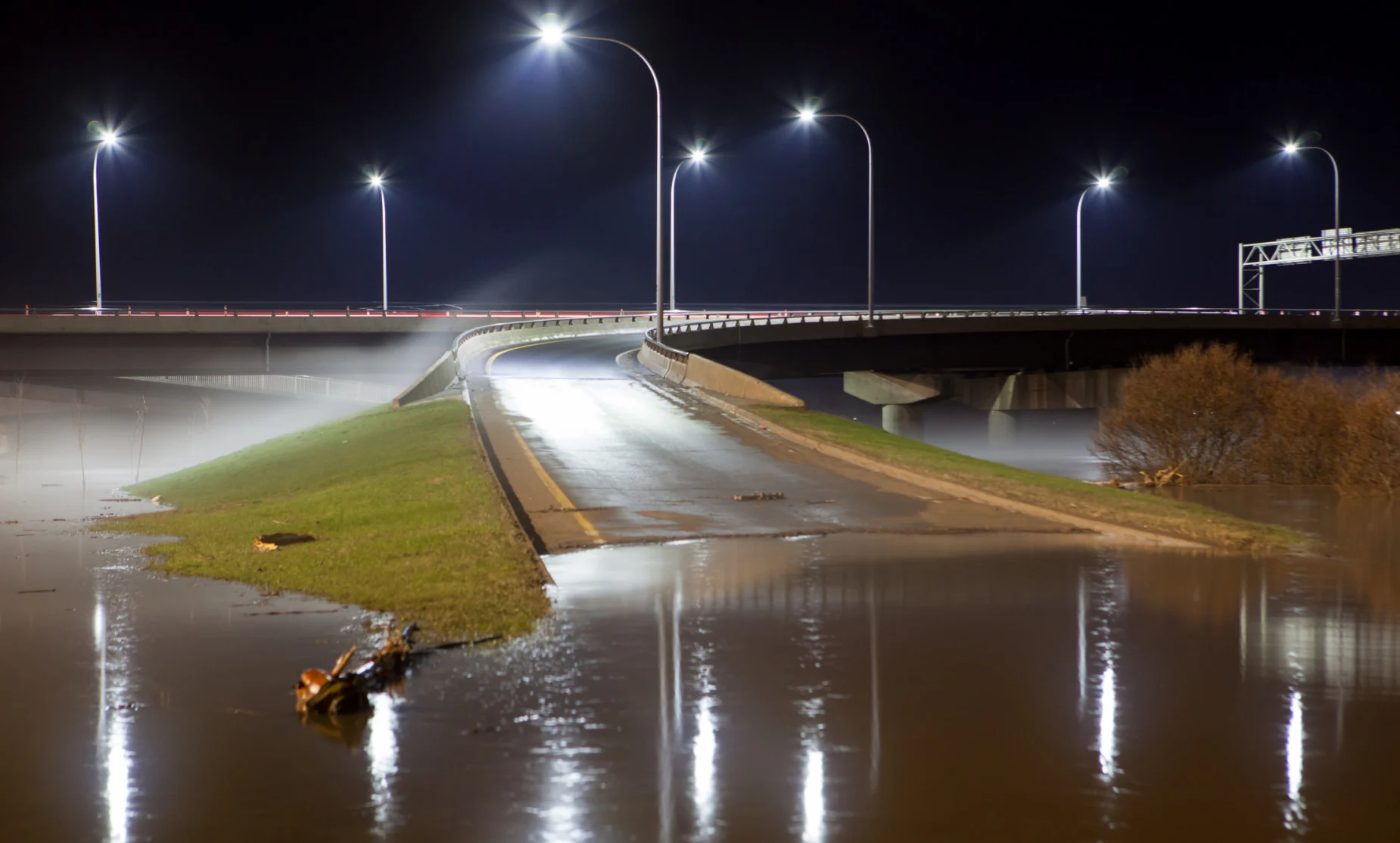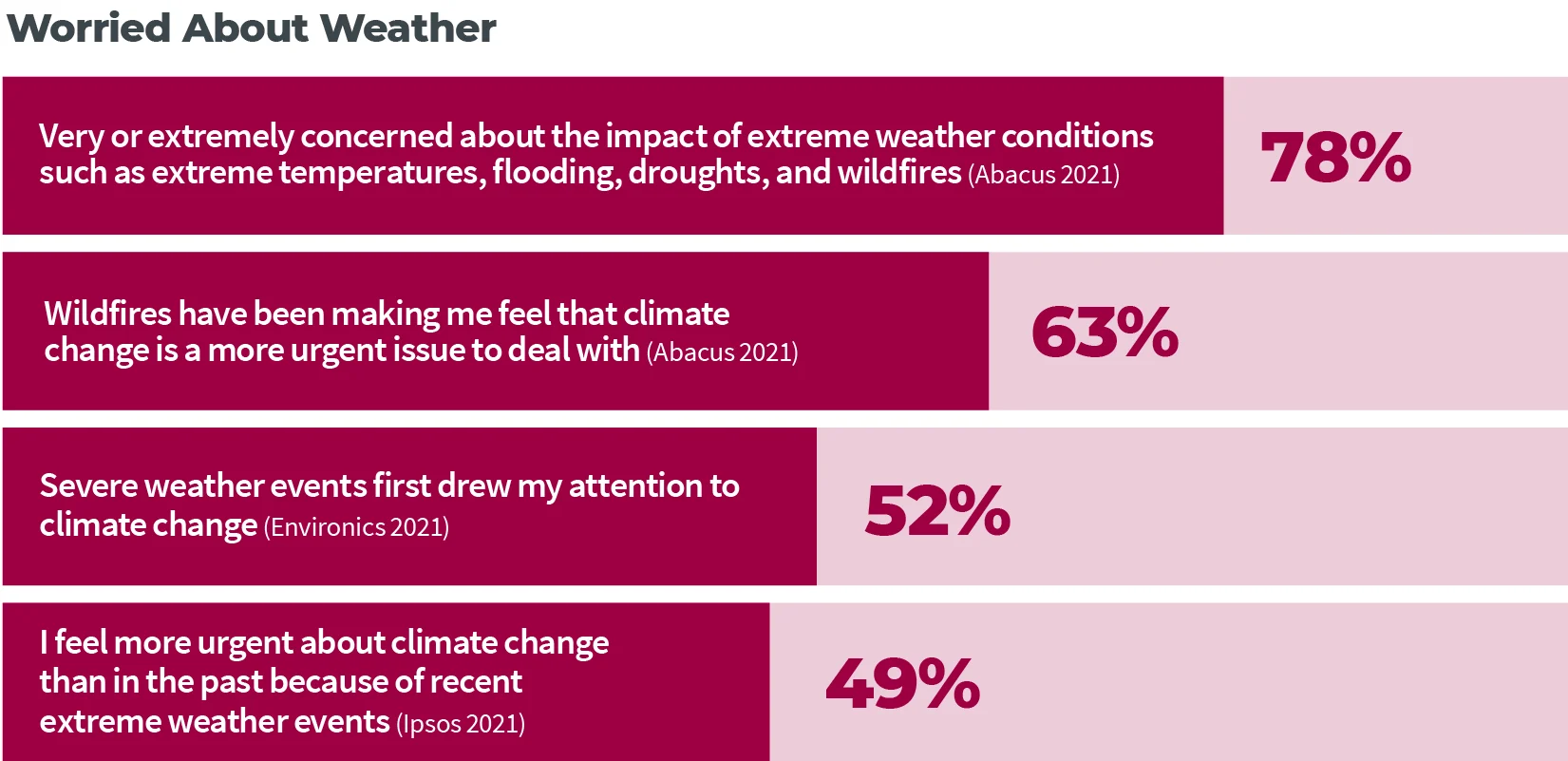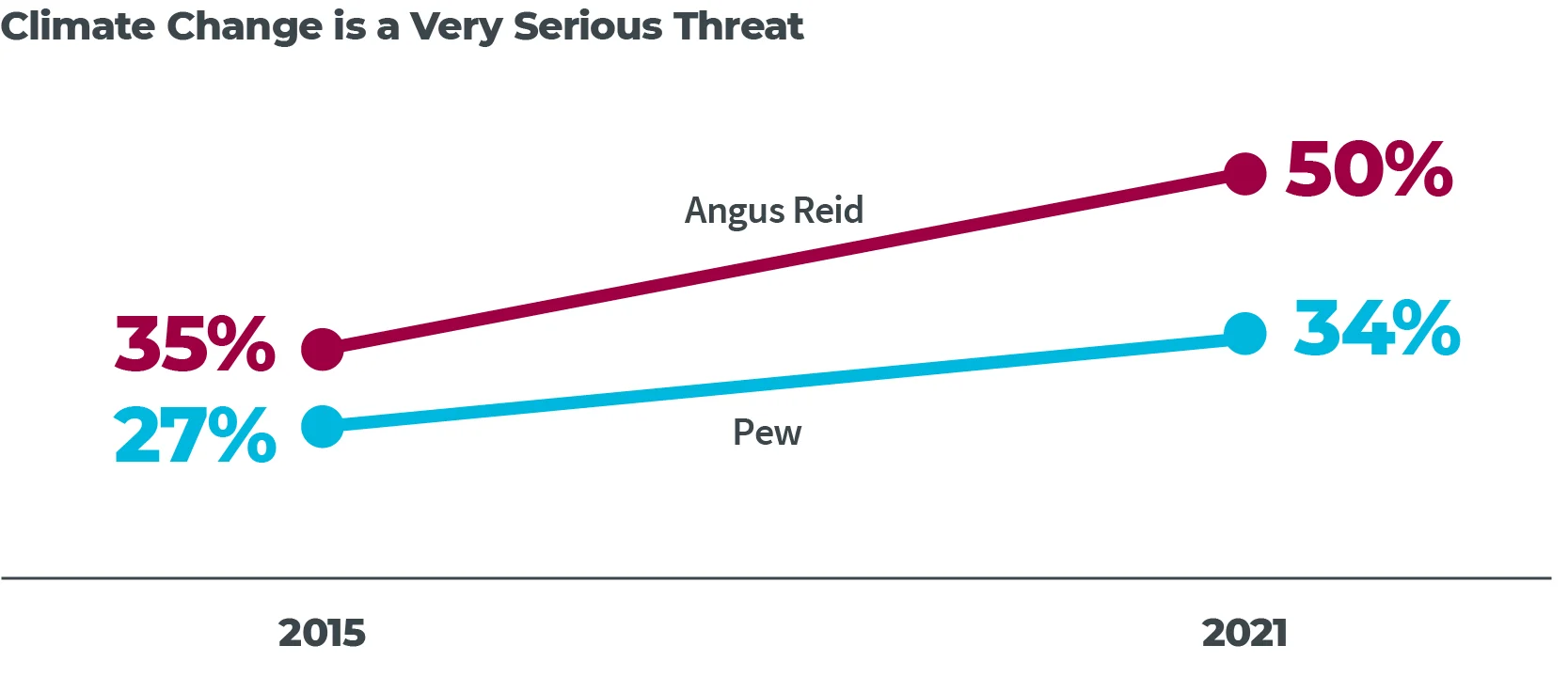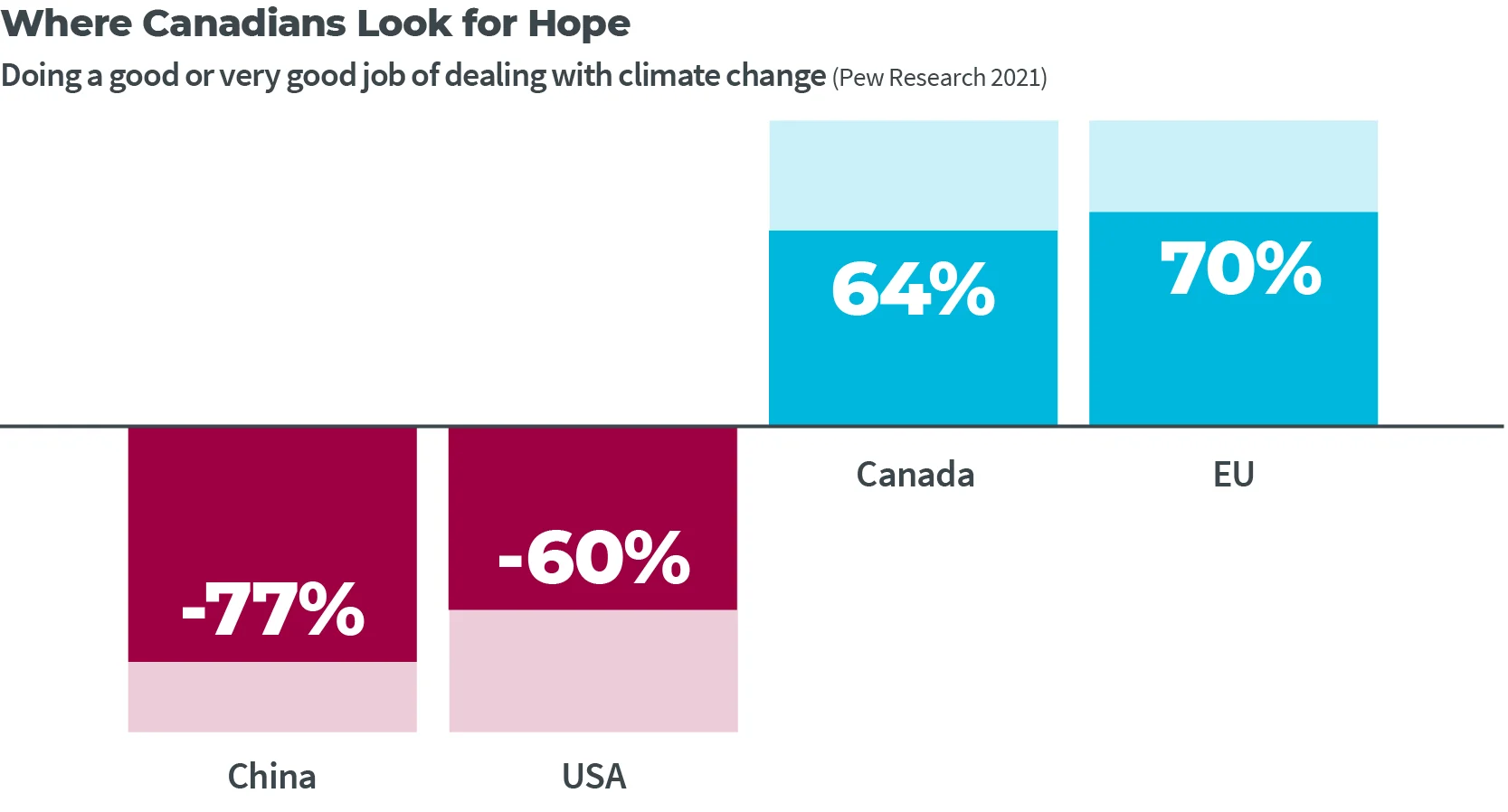
Extreme weather is changing Canadians’ views on the climate crisis
As extreme weather events are increasingly experienced across the country, worry about the climate crisis grows, according to public opinion polls.
In a new report that summarizes nationwide polling about climate change positions, from as many as 60 publicly-available surveys, analysts show that the rising concern is related to perceptions about weather events and that Canadians have a conflicted vision of our climate future.
The findings of an Abacus 2021 poll show that 78 per cent of Canadians were “very or extremely concerned about the impact of extreme weather conditions.”

Canadians are better understanding climate change through direct experience with a flood, drought, or fire, and with stories about extreme weather. According to the report, “Climate impacts are mounting in public perception and although climate change remains a psychologically ‘distant’ problem, the sense of proximity is becoming more immediate.” (Climate Access/ Climate Narratives Initiative)
The Environics 2021 poll also found 52 per cent of those Canadians surveyed felt severe weather events are drawing their attention to the climate crisis; 63 per cent felt wildfires are making them feel that “climate change is a more urgent issue” in the Abacus 2021 survey; and 49 per cent felt more concern about the consequences of a warming world in the present day than they did in the past because of “recent extreme weather events” in the Ipsos 2021 survey.
Relatedly, “within the past 7 months, 1.5 million Canadians have been convinced that climate change is having a direct impact on their health,” according to David Coletto of Abacus Data.
Similar findings were reported in the United States, where a recent Gallup poll found that a third of Americans had personally been impacted by severe weather over the past two years.
Researchers of the US data found a pronounced link between beliefs about climate change and this direct experience with extreme weather. Of those respondents who worried “a great deal” about climate change, about two thirds had been impacted personally by a severe weather event.
Only around a third of those who had not been personally impacted by extreme weather shared this level of worry.
Comparably, two thirds of those who personally experienced extreme weather thought of climate change as a “serious threat” and that the government was not taking enough action on the crisis. In those unaffected by such weather events, 36 per cent thought of the climate threat as serious, and less than half called out government inaction.
The numbers could signify that as climate change continues to manifest in devastating natural weather events — like the recent wildfires in Lytton, B.C., Colorado, and California; intensifying hurricane and tornado seasons; and freak events like the Texas ice storm — public outcry might grow from those affected.
Indeed, some of the poll analysis suggested that this may already be happening. Along with the Angus Reid 2021 poll that found that a full 50 per cent of Canadians considered climate change a “very serious” threat, there was a general shift in opinion toward a renewable future — 71 per cent believe an “energy transition” is “inevitable.”

Canadians overwhelmingly agree that climate change is a major problem. Half the population polled in a recent survey think climate change is a very serious threat. According to the report, this is the “highest since 2014.” (Angus Reid 2022/ Climate Access/ Climate Narratives Initiative)
Moreover, in the past two years alone, there was a nearly twenty point jump in those who believe that clean energy will be “very important” to the nation’s economy ten years from now, from 40 to 59 per cent of Canadians.
This, along with the sentiment shared by 77 per cent of Canadians that electric vehicles will be this main form of transport in ten years, and the majority belief (56 per cent) that the transition to green energy offers “more opportunity than risk,” heralds a shift in national support away from fossil fuel production, which has seen an erosion of eleven points (60-49 per cent) in just the last three years.
DESPITE HOPEFUL TRENDS, THERE ARE COMPLICATIONS
Another look at the relationship between public sentiment on climate and extreme weather events revealed that disagreement exists among respondents as to what such a weather event even is.
The rift comes on partisan lines, with 86 per cent of those on the left of the belief that extreme weather had become even more severe in the past five years, to only 48 per cent of those on the right.
The findings seem to suggest one’s partisan leanings about climate change may have more impact on how they perceive the severity of a weather event than that event changing their views on climate.

Interpretation of an extreme weather event is linked to existing political belief systems. According to the report, “conservatives are far less likely to report having experienced extreme weather than their neighbours holding centrist or left-leaning political views.” (Morning Consult/ Climate Access/ Climate Narratives Initiative)
What’s more, the rise of inequality and recent challenges of inflation, notably at the gas pumps, has shifted the attention of many Canadians away from climate and toward self-preservation — understandable when 57 per cent of families reported finding it difficult to feed their families in 2021 (up from 36 per cent in 2019).
Amid such a state of inequality, with brimming partisanship and distrust in institutions, the collective work required to fight the climate battle becomes that much more challenging. And analysis of the polls show that demand for climate action has dropped by 10 points (71-61 per cent) in the last five years.
Beyond the partisanship and distrust, perhaps undergirding this lack of momentum is a sense of fatalism about the climate crisis which seems to be felt by members across demographics.

Pollsters look towards Canada and the EU, and away from China and the U.S. when looking for hope. According to the report, “Canadians are most likely to see progress in Europe. Seventy per cent of Canadians say the European Union is doing a “good” or “very good” job dealing with climate change. (Pew Research Center 2021/ Climate Access/ Climate Narratives Initiative)
Noting the need to overcome this rising sense of fatalism, Sarah Roberton of analytics firm Environics said, “We need to build a sense of momentum.”
Part of the problem, says report lead author Chris Hatch, is that we're struggling to paint a picture of the possible pathways forward.
While 51 per cent of respondents in the Environics 2021 survey believed there was still time to address the worst impacts of the climate crisis, the other half thought it was already too late.
Thumbnail credit: Devon OpdenDries/ Moment/ Getty Images






